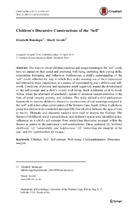| dc.contributor.author | Benninger, Elizabeth | |
| dc.contributor.author | Savahl, Shazly | |
| dc.date.accessioned | 2021-07-23T12:09:38Z | |
| dc.date.available | 2021-07-23T12:09:38Z | |
| dc.date.issued | 2017 | |
| dc.identifier.citation | Benninger, E., & Savahl, S. (2017). Children’s discursive constructions of the ‘Self.’ Child Indicators Research, 10(4), 899–927. https://doi.org/10.1007/s12187-016-9389-8 | en_US |
| dc.identifier.issn | 1874-8988 | |
| dc.identifier.uri | https://doi.org/10.1007/s12187-016-9389-8 | |
| dc.identifier.uri | http://hdl.handle.net/10566/6468 | |
| dc.description.abstract | The ways in which children construct and assign meaning to the ‘self’ could have an impact on their social and emotional well-being, including their coping skills, relationship formation, and behaviour. Furthermore, a child’s understanding of the ‘self’ could influence the way in which they make meaning out of their experiences and internalize these experiences as a means of understanding one’s abilities and self-worth. Conditions of poverty and oppression could negatively impact the development of the self-concept and a child’s overall well-being. Such conditions exist in South Africa, where the aftermath of apartheid’s system of structural racism continues in the form of social inequity, poverty, and violence. This study utilized a child participation framework to explore children’s discursive constructions of and meanings assigned to the ‘self’ within two urban communities of the Western Cape, South Africa. Eight focus group discussions were conducted amongst fifty-four children between the ages of nine to twelve. | en_US |
| dc.language.iso | en | en_US |
| dc.publisher | Springer Nature | en_US |
| dc.subject | Children | en_US |
| dc.subject | Self-concept | en_US |
| dc.subject | Well-being | en_US |
| dc.subject | Child participation | en_US |
| dc.subject | Discourse analysis | en_US |
| dc.title | Children’s discursive constructions of the ‘Self | en_US |
| dc.type | Article | en_US |

